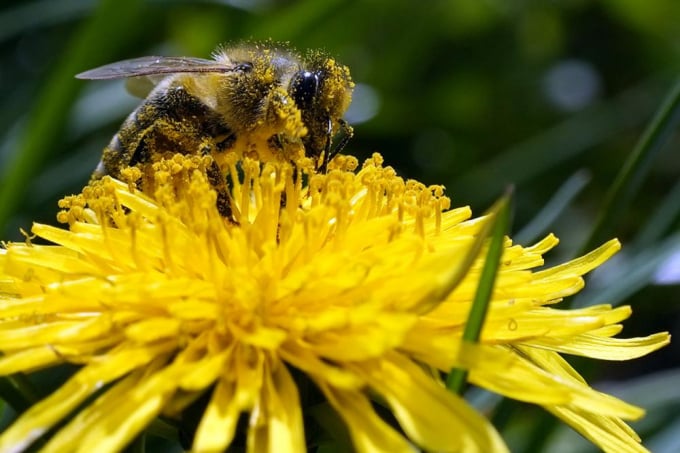November 26, 2025 | 19:55 GMT +7
November 26, 2025 | 19:55 GMT +7
Hotline: 0913.378.918
November 26, 2025 | 19:55 GMT +7
Hotline: 0913.378.918

A bee searches for pollen on a flower during a sunny spring day in Belgrade, Serbia, Friday, April 8, 2022. A study published in the journal Nature on Wednesday, April 20, 2022 says habitat loss from big agriculture and climate change are combining to threaten the world's insects. Photo: Darko Vojinovic
While insects may bug people at times, they also are key in pollinating plants to feed people, making soil more fertile and they include beautiful butterflies and fireflies. Scientists have noticed a dramatic drop both in total bug numbers and diversity of insect species, calling it a slow-motion death by 1,000 cuts. Those cuts include pesticides and light pollution.
Big single-crop agriculture that leaves less habitat and leafy food for bugs plus higher temperatures from climate change are huge problems for insects, but a new study in the journal Nature Wednesday based on more than 750,000 samples of 18,000 different species of insects says it’s not just those two threats acting on their own. It’s how habitat loss and climate change interact that really smashes bug populations.
In about half the cases where numbers of insects had plummeted, researchers found climate change and habitat loss from agriculture magnifying each other. In more than a quarter of the cases of biodiversity loss, meaning fewer species, the same dynamic was at work.
“We know insects are under threat. We’re now getting a much bigger handle on what they are threatened by and how much,” said study author Charlotte Outhwaite, an ecologist at the University College of London.
“In this case, the habitat loss and climate change can often be worse than if they were acting on their own, as one can make the impact of the other worse and vice versa,” Outhwaite said. “We’re missing part of the picture if we are only looking at these things individually.”
For example, monoculture agriculture often reduces tree shading, making it hotter in a given spot. On top of that comes climate change, she said. Then insects that need heat relief or need to move north for cooler climates can run into problems with lack of proper habitat from large farms.
It’s especially a problem in countries like Indonesia and Brazil, where forests are being cleared and temperatures are heating up higher than other parts of the globe, Outhwaite said.
That’s hard on insects like the pesky midge.
“Cocoa is pollinated primarily by midges and people don’t like midges. You know they’re the annoying ones that bite you, they pester you at picnics,” Outhwaite said. “But if you like chocolate you should be appreciative because without them we would have a lot less cocoa.”
The same can be said about bees, which are having a hard time with warming from climate change and single-crop farming, Outhwaite said.
Insect pollinators are responsible for about one-third of the human diet, according to the U.S. Department of Agriculture. And 2 out of 5 species of invertebrate pollinators, such as bees and butterflies, are on the path toward extinction, a 2016 United Nations science report said.
What makes this study important is that it’s the first to link climate change and industrialized agriculture together in explaining harm to insects, said University of Connecticut entomologist David Wagner, who wasn’t part of the study. Because the study used so many different samples and species and looked around the world, that gives its findings more credibility, Wagner said.
(AP)

(VAN) A new study reveals how the simultaneous effects of ocean acidification, salinity and loss of oxygen are making the world more fragile.

(VAN) Hopes are growing that the creation of the first 3D turkey gut model could be a turning point in the battle against the virulent blackhead disease.

(VAN) Tyson, America’s biggest meat supplier, plans to shutter one of its largest beef processing plants as the industry continues to struggle with low cattle supplies and political pressure from Washington.

(VAN) New FAO study shows how digital solutions are empowering farmers and fishers to prevent losses and build resilient agrifood systems.

(VAN) Brazil's COP30 presidency pushed through a compromise climate deal on Saturday that would boost finance for poor nations coping with global warming but that omitted any mention of the fossil fuels driving it.

(VAN) Poultry farmers in the UK have been warned that they could face one of the worst winters yet for bird flu.

(VAN) Prices of main-crop paddy have risen sharply, with jasmine rice hitting 16,100 baht per tonne — the highest level in years.